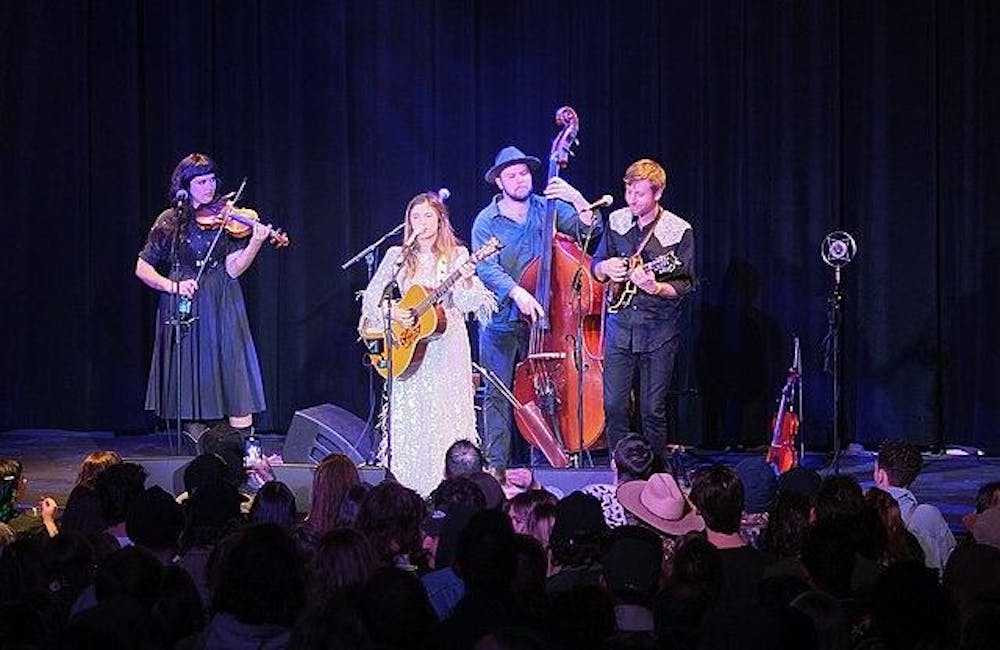Having spent her twenties living in her van as a busker before settling in Nashville, the 35-year-old country singer Sierra Ferrell — known for her powerhouse voice and eclectic live performances — returns to her nomadic roots in “Trail of Flowers.” Filled with galloping rhythms and permeated with nostalgia, Ferrell’s follow-up to her 2021 studio album “Long Time Coming” reflects on her early time on the road and the diverse musical influences she gained along the way. A heartwarming exploration of love and loneliness steeped in the rich country tradition, the record is a timeless addition to the roots music canon.
After gaining critical and popular acclaim with her album “Long Time Coming” — which features lyrically simple but sweet love songs such as the internet sensation “In Dreams” — Ferrell’s songwriting takes a more introspective approach in “Trail of Flowers.”
The album’s lyrical intimacy is apparent from the first track, “American Dreaming,” as Ferrell quietly strums an acoustic guitar and hums before the rest of the band — composed of banjo, bass, drums and electric guitar — joins in. Departing from her normal directness, Ferrell instead uses imagery in this opening track as she laments, “Every set of curtains opens to the open road / And I’m missing you like hell / This van is like a prison cell.” These lyrics set the tone for the rest of the album by painting a vivid picture of a lost hope that is distinctly American.
This image of American loneliness continues in the following track, the standout “Dollar Bill Bar.” With its catchy melody, the song captures the essence of a pop song while preserving the spirit of a country dive. However, the raunchy guitar tone and Ferrell’s blasé delivery — quintessential elements of the pleasure-seeking Western honky-tonk — cannot fully disguise her self-conscious feminine insecurity as she sings “Just turn around here and leave here / ‘Cause I’m telling you you’re better off alone.”
For the next two songs, Ferrell’s lyrics take a backseat to her musical experimentation. Rousing fiddle and banjo drive the wildly upbeat “Fox Hunt” as Ferrell demonstrates her instrumental chops in an homage to her traditional bluegrass roots. Next, Ferrell turns to the steady guitar driven beat and wandering horns of gypsy jazz for “Chittlin’ Cookin’ Time in Cheatham County,” an arrangement that gives her room to explore vocally. Ferrell sings with a more staccato delivery, and at one point sing-speaks a verse in the vein of Dolly Parton’s “I Will Always Love You.”
After exploring country music’s musical influences, Ferrell plays with its themes — notably, the standard use of the male gaze. The sixth track, “Money Train,” is a classic western tune with a Johnny Cash-esque shuffle that playfully subverts the gender dynamics of a standard cowboy song. Ferrell’s man “couldn’t rope or ride, never slept outside.” Instead, it is his sweetheart who must “keep a cowboy warm” with her love. The song is a tongue-in-cheek demonstration of the passive role of women in many classic country songs. The following track, “I Could Drive You Crazy,” is a call and response between voice and fiddle which similarly offers women a more active role in their romantic relationships.
Yet, even as Ferrell challenges gender roles of the genre she never takes herself too seriously. The ninth track, “Rosemary,” is a delightfully strange folk ballad in which Ferrell is solely accompanied by an aggressive, nearly out-of-time acoustic guitar as she sings of the titular “Rosemary,” the singer’s romantic rival.
The song culminates in Ferrell’s declaration that “I went to Rosemary’s / Where I’m killing both of you” — her rival and her traitorous lover. Listeners are left with the bizarre image of the adulterous couple buried in the garden — a taste of the folkish whimsy which Ferrell brings to her stage performances.
As the album nears its close, the tenth and eleventh tracks introduce a romantic hope which has thus far been absent. In “Lighthouse,” a mandolin brightens the mix with its clear, high timbre as Ferrell sings of “the guiding light” she dreams her lover will provide. “I’ll Come Off The Mountain” is similarly lighthearted. Fiddle drives the bouncing melody as Ferrell sings “I’m around your mouth because you’re sweet like honeybees.” All she needs is someone to “say [her] name” and she will throw herself into love.
However, “No Letter,” the record’s close, dashes these romantic hopes, returning to the album’s earlier loneliness. At first glance a simple song about waiting for a note from a lover, Ferrell’s direct lyrics — deeply poignant in their simplicity — strike to the core of her solitude as she laments “I have been lonely, I have been blue.” The final sound of the album is Ferrell’s quiet sigh, hinting that the letter — and the romantic acceptance — she yearns for will never arrive, perfectly encapsulating the despair and hope which collide throughout the album.
The emotional vulnerability Ferrell reveals in “Trail of Flowers” is unmistakably raw, but somehow the listener still emerges from the experience feeling renewed thanks to her seamless blending of a familiar country feel with a refreshing female lyrical perspective. Ultimately, the record — in capturing an interior world of pain and hurt — points towards the power of music as a way to help Ferrell forge a path through her struggles.







